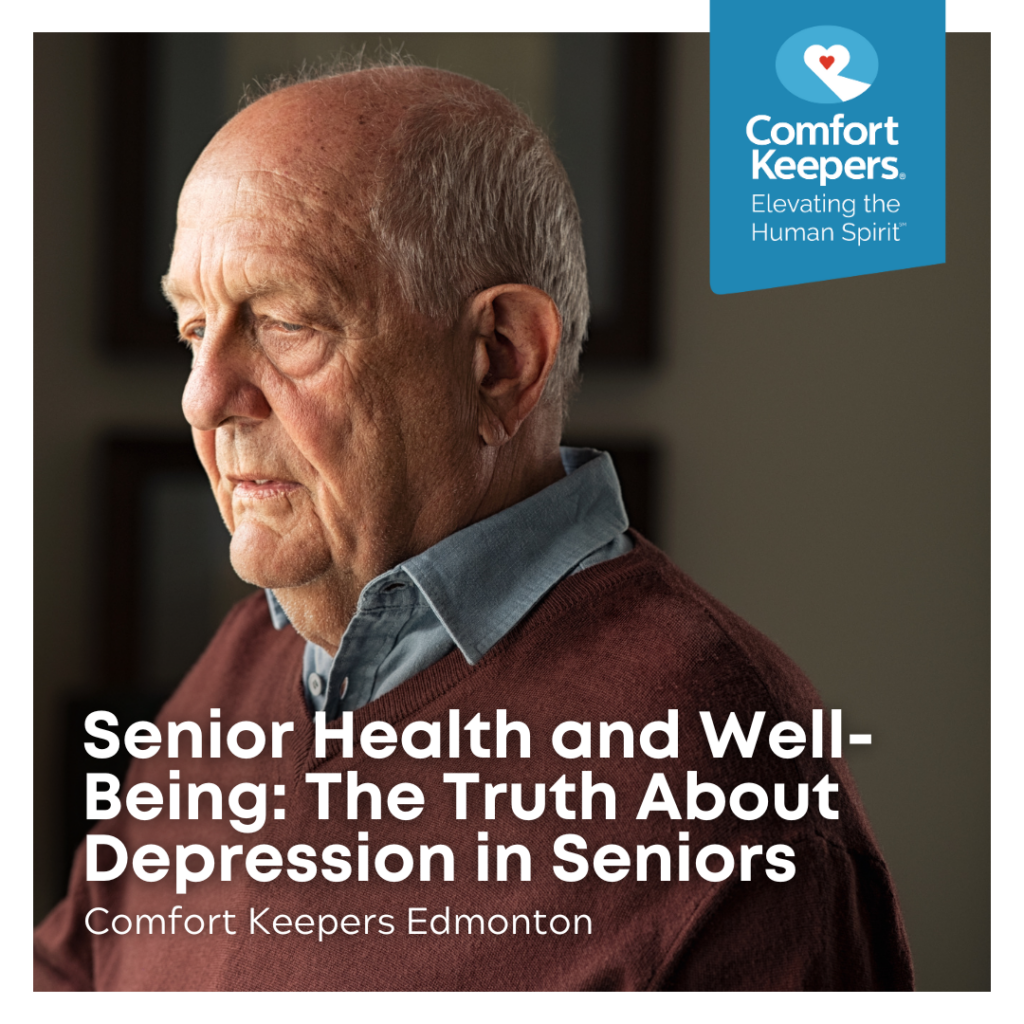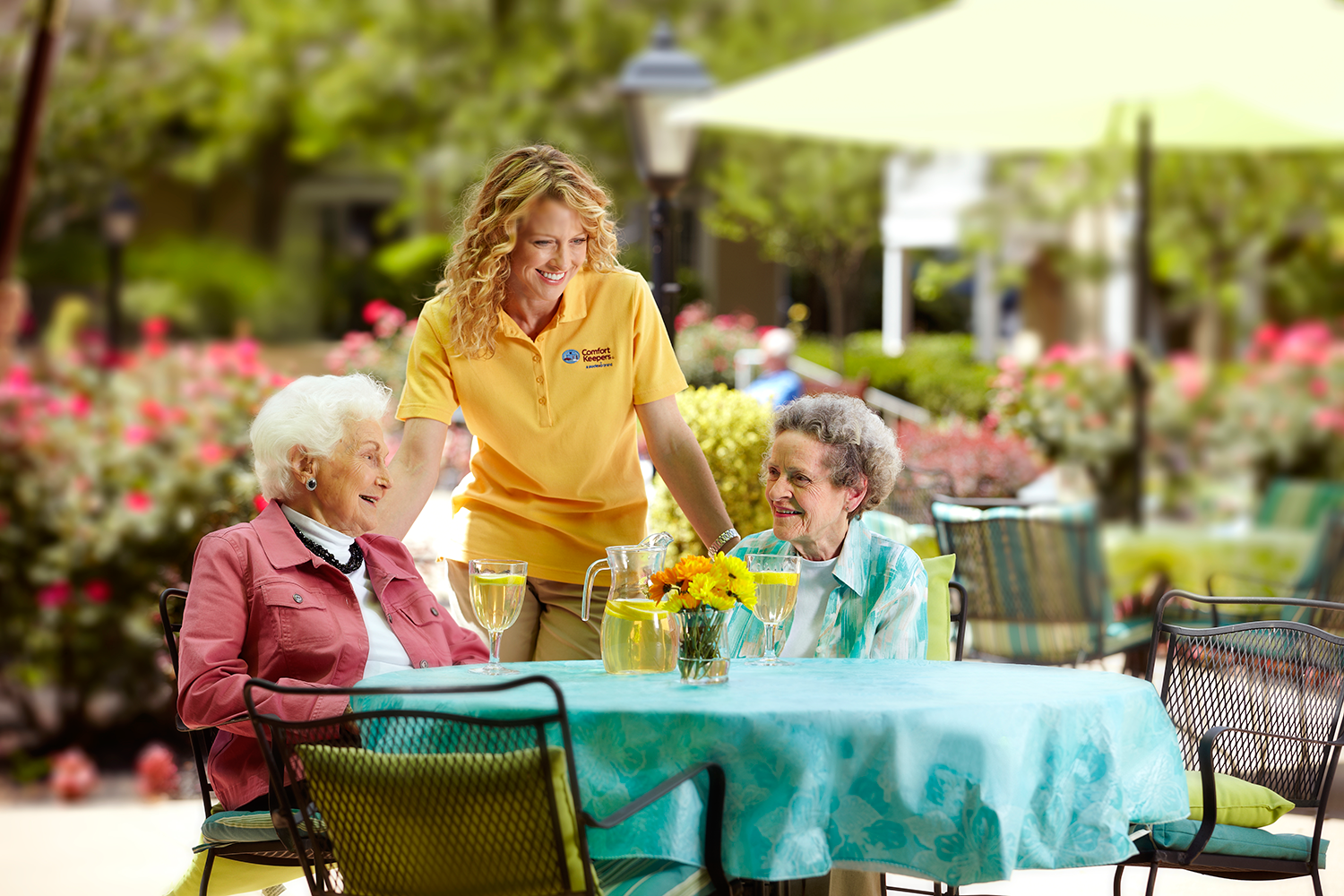Senior Health and Well-Being: The Truth About Depression in Seniors
Senior Health and Wellbeing | May 14, 2024

What Every Senior in Edmonton, AB, Needs to Know About Depression and Mental Health
Depression in Senior Citizens | Depression is a common problem among older adults, but it is NOT considered a normal part of aging. Studies show that most seniors feel satisfied with their lives, despite having more illnesses or physical problems.
In fact, 10 to 15% of seniors suffer from depression in Canada. The percentage of women suffering from depression is almost double that of men.
Above all, seniors with depression feel more than just sad or blue. Depression is a common but serious mood disorder that requires real treatment. Seniors with depression should never be viewed as weak-minded or character flawed. Depression can not be turned off, it is an illness with serious consequences.
Senior Grief vs. Senior Depression
Major life changes, that occur as we age, may cause unrest, uneasiness, stress, and sadness. For example, grief after the loss of a loved one is an expected reaction and generally does not require professional mental health treatment.
However, moving from work into retirement, or dealing with a serious illness can leave people feeling down or anxious. After a period of adjustment, many seniors can regain their emotional balance, but others do not and may develop symptoms of depression.
Depression Impacts Seniors Differently Than Younger People
While depression is more common in women, it more often increases the risk of suicide in older men. The suicide rate in people aged 80 to 84 is more than twice that of the general population. That’s why the National Institute of Mental Health considers depression in people aged 65 and older to be a major public health problem.
Likewise, depression is associated with an increased risk of cardiac diseases and an increased risk of death from illness. Depression also has been associated with an increased risk of death following a heart attack.
Similarly, depression can also reduce a senior’s ability to rehabilitate. Studies of nursing home patients with physical illnesses have shown that the presence of depression substantially increases the likelihood of death from those illnesses.
For this reason, it is important to make sure that seniors are evaluated and treated, even if the depression is mild.
Seven Warning Signs of Depression in Senior Citizens
Most importantly, if you suspect that your loved one is suffering from depression, pay attention to these health indicators:
#1. Irritability:
Sudden mood changes can suggest depression. If a normally cheerful senior now gets easily irritated, take note.
#2. Loss of self-regard:
Experts say that one of the most obvious signs of depression in seniors is seen when they show a lack of pride in their appearance. Perhaps your mother has stopped wearing makeup, or your father has stopped bathing.
#3. Social withdrawal:
Depressed seniors tend to shut out others and avoid social situations.
#4. Increased pain:
Depression often amplifies physical pain.
#5. Recent illness or surgery:
Seniors recovering from major illness or surgery are much more likely to develop a depressive episode, and some go on to have a depression disorder. Research shows that 15 percent of people who are discharged from a hospital leave with depressive symptoms.
#6. Recent loss:
Older persons have a much higher risk than younger people of falling into depression after the loss of a loved one. It’s quite common.
#7. Insomnia:
Studies have linked depression with the inability to sleep, and insomnia is a risk factor for depression onset and recurrence – particularly in seniors.
Treatment for Depression in Senior Citizens is Available
Doctors are encouraged to screen for depression with their senior patients routinely. In short, doctors use a series of standard questions, a primary care doctor can provide an effective screening for depression, allowing for better diagnosis and treatment.
Sometimes, a combination of the following treatments may be used. Ask your loved one’s doctor more about these protocols.
There are several treatment options available for depression:
- Medicine
- Psychotherapy or counselling
- Electroconvulsive therapy or other newer forms of brain stimulation (such as repetitive transcranial magnetic stimulation (rTMS)).
Don’t Let Your Senior Loved One Suffer
While it’s natural to experience some grief in the face of major life changes, clinical depression doesn’t go away by itself, can last for several months, and needs to be treated by a professional. It’s best to be a part of the solution – and because of the social stigma attached to this disorder, you’ll be doing your loved one a favour.
If you suspect your loved one is suffering from minor or major depressive symptoms, encourage him or her to seek help. Comfort Keepers® can help.
Comfort Keepers® Edmonton is Proud to Offer a Wide Range of Home Senior Care Services
Our trained caregivers will ensure your loved one is comfortable, independent and safe in their home. On top of that, we will also aim to enhance their overall health, quality of life and general happiness.
Top-Notch Home Healthcare for Seniors in Edmonton, Alberta
Comfort Keepers of Edmonton offers a wider range of senior care services. We offer retirement care, respite care, senior care, companionship care, end-of-life care, post-surgery care, palliative care, personal care, and senior living transition services. If you are concerned about the health and well-being of your aging loved ones we can help with 24-hour care and more!
Helping Seniors Age-in-Place with Companionship Care and Interactive Caregiving™
Empathetic care starts in the heart and allows us to meet our client’s needs. Our trained caregivers are selected with one specific quality in mind, empathy. We strive to stimulate our clients emotionally, mentally and socially, thus enhancing their overall quality of life.
Our Interactive Caregiving™ provides a system of care that addresses companionship, safety, nutrition, mind, body, and activities of daily living (ADLs). The system increases seniors’ sense of well-being, independence and companionship by focusing on Senior Mind, Senior Body, Senior Nutrition, and Senior Safety.
Affordable and Client-Directed Homecare is Available for Qualifying Albertans
Comfort Keepers® Edmonton is an Approved Service Provider for the Client Directed Homecare Invoicing (CDHCI) Program Offered by Alberta Health Services.
What is the Client Directed Home Care Invoicing Program (CDHCI)?
CDHCI is a great program provided by Alberta Health Services (AHS), allowing clients to choose an approved agency like, Comfort Keepers Edmonton for Personal Care, Respite Care and Homemaking needs. The chosen agency can then bill AHS directly for services rendered for approved hours through Alberta Blue Cross. Read more about the program HERE.
Accredited Home Care Edmonton
Comfort Keepers® Edmonton was awarded the “Accredited with Exemplary Standing” seal by Accreditation Canada. This honour demonstrates Comfort Keepers’ commitment to offering safe, high-quality home care to its senior clients in Edmonton, AB.
To learn more about senior in-home care in Edmonton, contact the Comfort Keepers® office. Our service territory includes Edmonton, Devon, Sherwood Park, Stony Plain and surrounding areas, contact the Comfort Keepers Edmonton office at 780-465-4665.
References:
- National Institutes of Health (NIH) Senior Health. “Depression”. Web. 2016.
- American Psychological Association. “Aging and Depression”. Web. 2016.
- A Place for Mom. “Elderly Depression: Symptoms & Care”. Web. 2015.
- WebMD. “Depression in the Elderly”. Web. 2016.
- Mood Disorders Association of Ontario. “Frequently Asked Questions – Seniors and Depression”. Web 2016.
Individualized Home Care Options
Long-Term Home Care, 24 Hour Home Care & Short Term Care Options Customized for You







